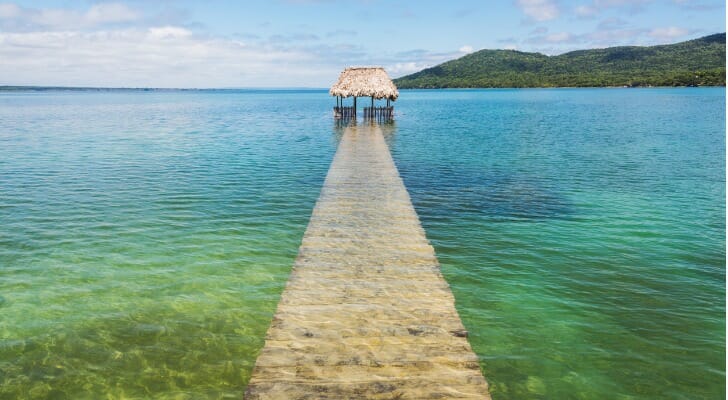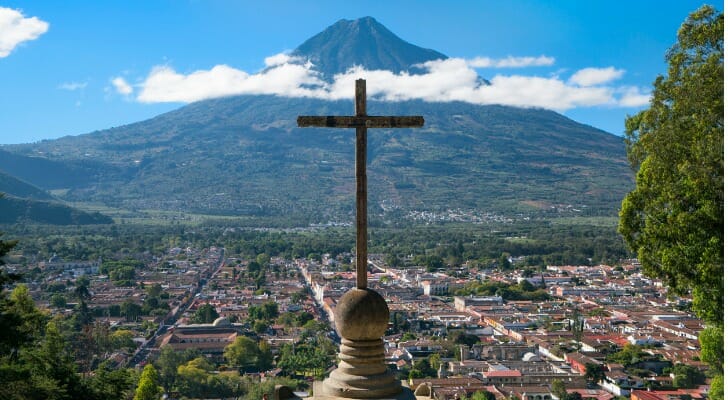If you’ve thought about retiring in Central America, you’ve likely learned plenty about Costa Rica and Panama, two popular destinations for ex-pat retirees. However, their neighbor Guatemala, the Mayan heartland of Central America, is another attractive retirement destination in the region. Guatemala’s beautiful landscapes include Lake Atitlan, a lake created by a massive volcanic crater, as well as beautiful coastlines and mountains. The country draws people in with its Mayan ruins and beautiful scenery, but people stay for the incredible food, quality of life and friendly people.
If you’re considering spending your retirement abroad, be sure to speak with a financial advisor to build a financial plan.
Getting a Guatemalan Visa
The easiest way to get a visa to stay in Guatemala long-term is to apply for Temporary Residence. These permits are good for two years and are renewable. You can also choose to apply for a Permanent Residency permit at the end of your two years. You can apply for your Temporary Residence permit at the Ministerio de Relaciones Exteriores in Guatemala City. There, an officer will certify them as valid.
When you visit the Ministerio de Relaciones Exteriores, you should bring:
- A recent photograph
- Your passport and photocopies of each page in your passport( all must be notarized by a lawyer)
- A certificate of validation for your passport issued by the United States embassy or consulate and accredited to the government of Guatemala. These accreditations are called Passos de Ley
- Proof that you have no criminal record in the United States
- An affidavit of a Guatemalan sponsor or proof of your economic solvency
Cost of Living in Guatemala
Overall, the cost of living in Guatemala is about 40% lower than in the United States, according to Numbeo. For example, groceries and restaurant dining are about 60% less in Antigua, a popular retirement destination, than in New York City. Milk is 23% less expensive in Antigua than in New York City and domestically produced beer is approximately 32% cheaper in Antigua than in New York City.
However, the cost of a summer dress from a global name brand chain store is about 21% more in Antigua than in New York City, while internet access is nearly 10% more in Antigua than in New York City.
Housing in Guatemala

Average rents in Guatemala are, overall, 63% lower than in the United States. In Antigua, the difference is striking: the average cost of a one-bedroom apartment in the city center costs $501 per month compared to $3,329 per month for a similar unit in New York City – an 85% difference.
If you choose to buy an apartment in the city center of Antigua, you can expect to pay about $118 per square foot. This is inexpensive compared to New York City, where someone would pay – on average – about $1,418 per square foot, according to Numbeo.
Taxes in Guatemala
You are legally able to work in Guatemala with a Temporary Residence permit. If you work in Guatemala, your income will be taxed at 5% for the first 300,000 of quetzal (the nation’s currency). This is equal to about $39,085. Any amount you earn over that amount will be taxed at 7%. If you earn income in Guatemala, you might be able to get the Foreign Earned Income Exclusion on your U.S. taxes.
However, if you are retiring, you may be on a fixed income from the United States. In this case, your pension, Social Security and other retirement income will not be taxed. Any American living abroad will need to file their taxes in the United States each year. Balancing American and Guatemalan taxes can get complicated, so we recommend working with a financial advisor or tax professional in the U.S. that can help you navigate both systems.
Healthcare in Guatemala
Like other countries in the world, Guatemala has universal healthcare coverage. However, the Guatemalan Civil War, which ended in 1996, impacted the development of the universal healthcare system. Therefore, while the system exists, it is unable to serve most Guatemalan citizens. The World Health Organization ranks the country’s healthcare system at 78th out of 191. That’s a contrast to Costa Rica, whose healthcare system the WHO ranks as 36th.
The country has three parts to its healthcare system: public sector, nonprofit private sector and for-profit private sector. The best hospitals and healthcare facilities in Guatemala are in Guatemala City and are private hospitals. Therefore, it is wise to have private healthcare insurance while in Guatemala. Private healthcare insurance typically costs less than $100 per month. Guatemala doesn’t use prescriptions. However, it’s possible to purchase the medications you need at any pharmacy that carries the medication.
Guatemala doesn’t mandate vaccines, but several are highly recommended, such as tetanus, typhoid, hepatitis A and tuberculosis.
Safety in Guatemala
Guatemala’s public safety has improved significantly in the last 20 years since the end of the civil war. The center of Guatemala City has the highest crime rates in the country, but areas like Antigua, where many American expats live, report very low crime rates.
Guatemala’s cool, mountainous climate makes it susceptible to flash floods and destruction caused by rain. The ecosystem also makes it home to mosquitoes that can carry Dengue fever and malaria. Planning for climate issues can help expats to prevent the dangers caused by the climate.
In some parts of Guatemala City passengers on public buses are vulnerable to crime so it’s not a good idea to take public buses in the city nor the so-called chicken buses from Guatemala City to other communities.
Bottom Line

Guatemala is a beautiful country that has been attracting an increasing number of retirees in recent years. The town of Antigua, about an hour from Guatemala City, is the most popular area for expats followed by coastal cities. If you enjoy warmer climates, want a low cost of living and like friendly locals, you may want to retire in Guatemala.
Tips for Achieving Your Retirement Goals
- Consider talking to a financial advisor about retiring overseas. Finding the right financial advisor that fits your needs doesn’t have to be hard. Finding a qualified financial advisor doesn’t have to be hard. SmartAsset’s free tool matches you with up to three financial advisors who serve your area, and you can interview your advisor matches at no cost to decide which one is right for you. If you’re ready to find an advisor who can help you achieve your financial goals, get started now.
- It’s tough to plan for your retirement if you aren’t sure what kind of costs you’ll have when you actually retire. To get an idea of what to expect, an online retirement calculator can help.
Photo credit: ©iStock.com/Fernanda Reyes, ©iStock.com/Mlenny, ©iStock.com/leezsnow
